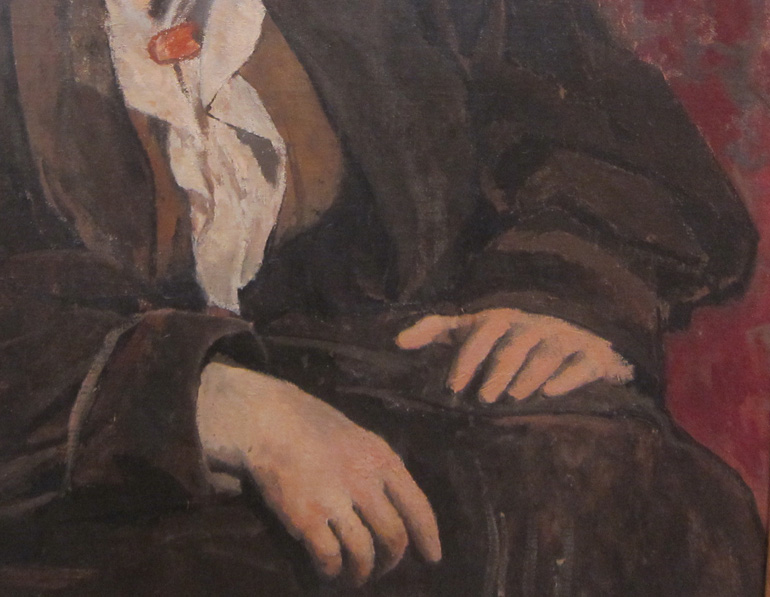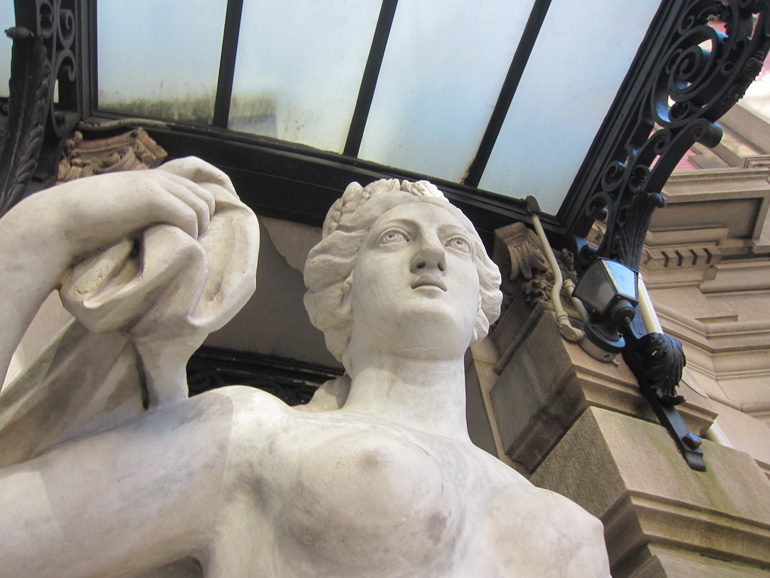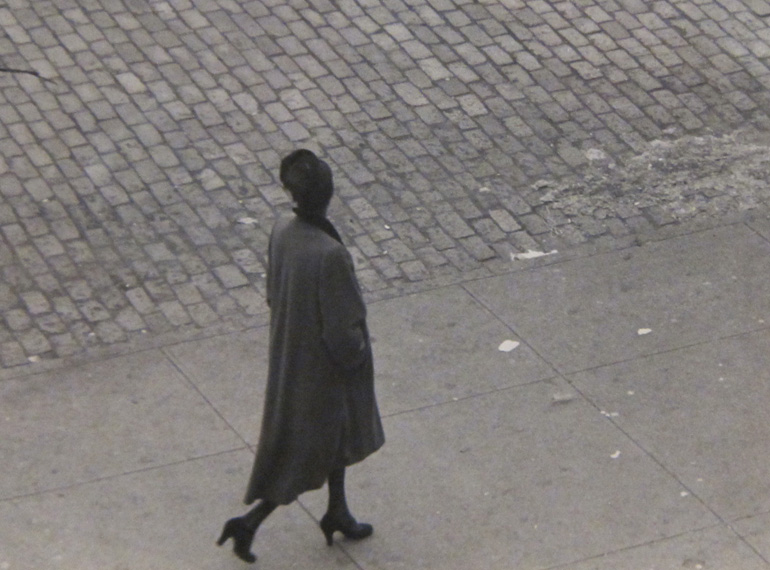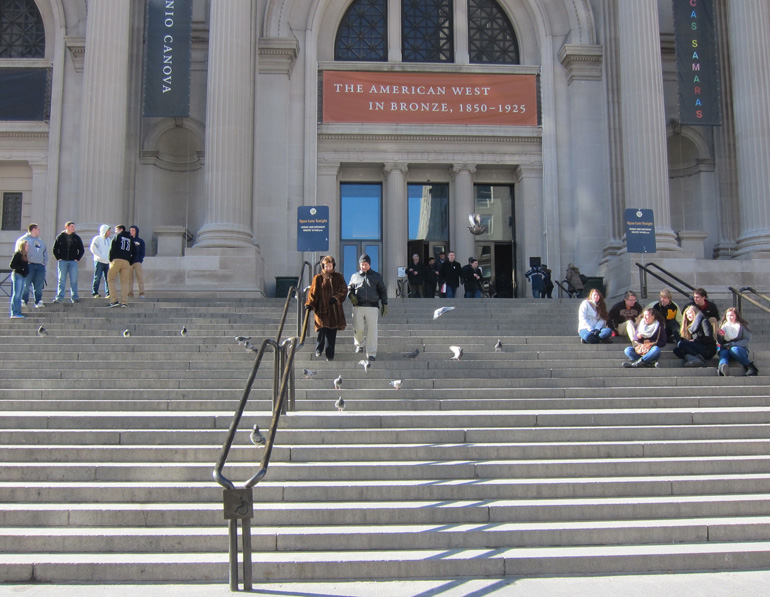Gotham Diary:
Same but Different
14 March 2014
The first thing I did when I got home was to head for the iTunes store to buy the soundtrack album, and I’m listening to it as I write. (Our modern world!) Instead of suggesting things to say about The Grand Budapest Hotel, however, Alexandre Desplat’s score is simply projecting a series of faces, all lively and mostly smiling, or at least twinkling: Ralph Fiennes, Saoirse Ronan, Mathieu Almaric, F Murray Abraham, Tom Wilkinson and Jude Law (playing the same person), Jeff Goldblum, Edward Norton, even Adrian Brody, whose character is very wicked, and Willem Defoe, wickeder still but outfitted with a prosthetic lower jaw. Harvey Keitel! Tilda Swinton, of course, although she’s not around for very long. I wouldn’t have recognized Léa Seydoux if I hadn’t known she was there — her part is small and distant. The members of the Society of the Crossed Keys: Bill Murray, Bob Balaban, Waris Ahluwalia, Fisher Stevens, Wally Wolodarsky. Tony Revolori, a new actor who seems almost manufactured to suit Wes Anderson’s specifications. Last but not least, Jason Schwartzman and the aptly named Owen Wilson: “Monsieur Chuck.”
The Grand Budapest Hotel is an enormous trifle. It has the look and feel of a massive old-time studio spectacle, Grand Hotel meets Ben Hur. And yet it relies ingenuously upon obvious miniatures, and the story itself is so slight that even to sketch it is to feel foolish. Let’s just say that Monsieur Gustave, the concierge at the Grand Budapest (Ralph Fiennes) spends a lot of time either on the run or in a tight spot. His predicaments are looted from the disasters of the Twentieth Century and the many movies made about them, but we are to take none of them seriously, except as film. The old nightmares are transformed into a dream of pastry — a sacrilege, were it not a success.
As M Gustave, Ralph Fiennes talks like a beautiful fountain on a lovely day: it doesn’t matter what he says, especially when every third word is “darling.” His performance is all the more vivid because the other actors deliver their lines as stock characters. The point is that M Gustave is not an ordinary mortal (although he is certainly mortal), but rather, as his heir tells an inquiring writer, a figure from an age that ended before he even stepped into it. As such, he embodies the very movie in which he appears.
A concierge does not invent possibilities, but he arranges for them to be made available to those he serves. He is in that sense a purchased deity. He is also very much like a filmmaker. Wes Anderson is welcome to attribute the inspiration for The Grand Budapest Hotel to the writing of Stefan Zweig — and I hope that the acknowledgment will bring readers to Zweig’s rich sensibility — but the movie that Zweig may have inspired Anderson to make was itself inspired by nothing other than “the movies.” Complete with cast and crew of thousands.
***
If I didn’t say very much — or anything very coherent — about Hannah Arendt’s Between Past and Future, that’s partly because I was given the impression, somehow, that that book is a continuation of thoughts initially set forth in The Human Condition, a collection of lectures delivered at the University of Chicago in 1957. Also, I felt that I needed to read more in order to understand where to place Arendt’s thinking. What, for example, is her field? Is she a philosopher? A political scientist? The back cover of The Human Condition (Chicago, 1998) labels her “one of the leading social theorists.” I didn’t know that “social theory” was a field — is it? Certainly Arendt’s type of theorizing has little in common with the “Theory” that had taken over academic life by the time of her death in 1975. And yet, what she was doing was new: she was responding to particularly novel problems that faced civilization after the two world wars. One of these, of course, was the sweeping advance in technology. People were capable of new things, from splitting atoms to launching space ships; from refashioning the human body to automating not only labor but also information. Another problem was the thoughtlessness of modern life.
What I propose in the following is a reconsideration of the human condition from the vantage point of our newest experience and our most recent fears. This, obviously, is a matter of thought, and thoughtlessness — the heedless recklessness or hopeless confusion or complacent repetition of “truths” which have become trivial and empty — seems to me among the the outstanding characteristics of our time.
Hardly had Arendt written her books than they became somewhat unfashionable. She was read, and even admired, but she was not followed. Now that the fashions that displaced her way of thinking have themselves been swept into trivial emptiness; now that the immediate future that she foresaw has passed from the speculative to the concrete; now, moreover, that we no longer have occasion to pause with wonder at the capacity of a woman to think both so deeply and so fruitfully — now, perhaps, we are ready to listen.
I’ve not gotten very far into The Human Condition, but already on page 8 there is something remarkable and something memorable. The remarkable thing is her grasp of the difference in repercussions caused by the two creation stories in Genesis, respectively. Here is Genesis 1:27, to which Jesus refers in Matthew 19:4:
And God created man in His image, in the image of God He created him; male and female he created them.
Whereas Paul, in I Corinthians 11, prefers the version given in Genesis 2. Here, “man” is created in Verse 7, but woman is not created until Verses 21-2. What difference does it make? “The difference indicates much more,” writes Arendt, “than a different attitude to the role of woman. For Jesus, faith was closely related to action; for Paul, faith was primarily related to salvation.” Action, Arendt has already stipulated, is what men do to and among each other, and this is indeed Jesus’ overriding concern. What men do, either to the world or to themselves, in order to make themselves more acceptable to God — that is not action even when it leads to action. Proper action manifests what Arendt calls “plurality,” and it is about plurality that she says something memorable:
Plurality is the condition of of human action because we are all the same, that is, human, in such a way that nobody is ever the same as anyone else who ever lived, lives, or will live.
We know this from just looking around us, but we have a strong tendency to forget it when we are tempted by ideas of “human nature.” So the first, one might say hygienic, rule of humane discourse is to abandon all talk of humanity (as a substantive) and of man or mankind. (It is pertinent here to remind regular readers that by “people” I invariably mean “men and women” or “women and men.”) The recognition and acceptance of plurality is the first step in any political thought. Our understanding of equality, moreover, must harmonize the “same but different” character of every person alive.
What’s the real attraction of reading Hannah Arendt? Simple: when I read her, I feel that the Enlightenment is not only alive but ongoing.




















